The Ultimate 2025 Guide to Planning Permission for Solar Panels in the UK
Planning permission for solar panels is one of the first things to consider when installing a solar energy system in the UK. Understanding solar panel building regulations is essential for a smooth, legally compliant installation. While many of these regulations primarily apply to installers, property owners must also be aware of the key requirements to avoid fines, legal issues, or even the forced removal of non-compliant systems.
Whether you are a business or a home owner installing solar panels, this guide covers everything you need to know from planning permission for solar panels to solar panel installation regulations ensuring your system fully complies with UK laws.
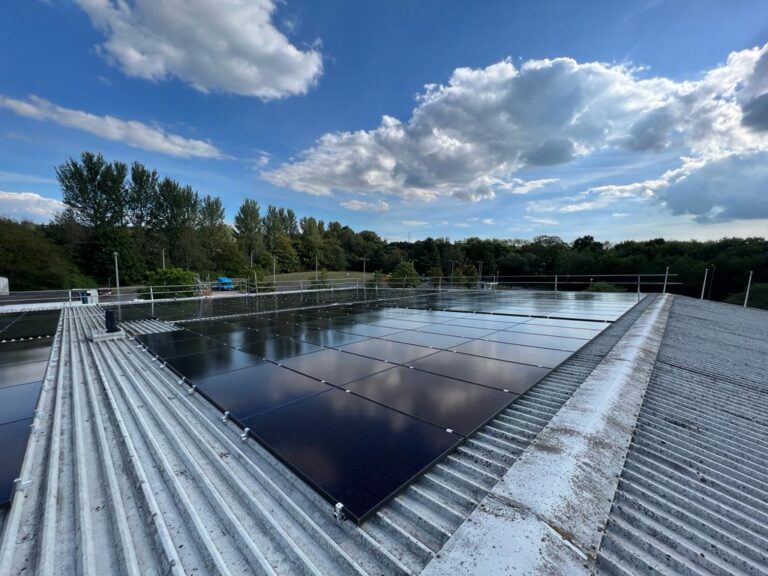
1. Solar Panel Installation Regulations: Commercial vs Residential Properties
Commercial Solar Panel Installations
Installing solar panels on commercial properties requires careful planning to ensure compliance with solar panel building regulations and planning permission for solar panels systems in the UK. The rules for commercial solar installations vary based on the size, location, and type of installation.
For solar systems under 1MW, planning permission is typically not required if the following conditions are met:
Flat-roof installations must not exceed the height of the building’s highest feature, excluding chimneys.
Roof-mounted panels must not extend more than 200mm from the roof surface.
Panels must be set back at least 1 meter from the roof edge to maintain structural safety and aesthetic considerations.
Ground-mounted solar panels must not exceed 9m² in area or 4 meters in height without additional planning approvals.
However, for commercial systems exceeding 1MW, planning permission is often required, and business owners should consult their local planning authority to determine specific requirements. Large-scale installations may also need environmental impact assessments and grid connection approvals.
Businesses considering solar panel installations should work with MCS-certified installers to ensure compliance with all solar panel installation regulations, avoid penalties, and maximise government incentives such as the Smart Export Guarantee (SEG).
Additional Solar Panel Installation considerations
For a modern, seamless look, choose black solar panel with anti-glare or anti-reflective coatings to reduce reflections.
Conduct a structural assessment to confirm that your roof is strong, stable, and capable of supporting solar panels for the next 25+ years.
Inform your building insurance provider of any changes resulting from your property's increased value
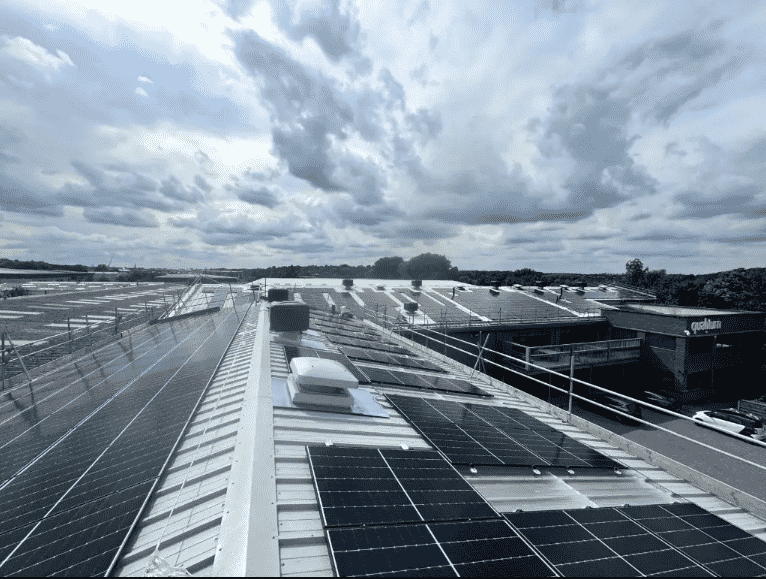
Domestic Solar Panel Installations
Homeowners often install solar panels to reduce energy bills and carbon footprints. There are two main types: roof-mounted and ground-mounted solar panels, each with distinct rules.
Roof-Mounted Solar Panels
These are the most common choice for homes because they save space and usually don’t require planning permission for solar panels if the following criteria are met:
Panels on front-facing roofs in conservation areas, heritage zones, or listed buildings require special approval.
Panels must not protrude more than 400mm from the roof plane (600mm for flat roofs as of December 2023).
Installations size depends on roof space and orientation
While most homeowners can proceed without permission, those in listed buildings or conservation areas should seek approval from the local council before proceeding.
Ground-Mounted Solar Panels
For homes with limited roof space or shading issues, ground-mounted solar panels are a viable option. Ground-mounted solar panels planning permission is usually unnecessary for systems under 9 square meters, but larger installations require approval if:
The total height of the installation exceeds 4 meters.
Panels are located less than 5 meters from property boundaries.
Panels are visible from public roads, particularly in conservation areas or heritage zones.
2. Building Regulations for Solar Panel Installations
All solar panel systems must comply with solar panel building regulations to ensure safety and structural integrity. Key areas include:
Fire Safety (Part B):
Panels must not block escape routes or pose fire hazards. Proper spacing, wiring, and mounting are crucial.
Structural Integrity (Part A):
Your roof must be strong enough to support the weight of the solar panels, particularly for older buildings.
Electrical Safety (Part P):
The installation must comply with BS7671 wiring regulations and be carried out by a qualified electrician.
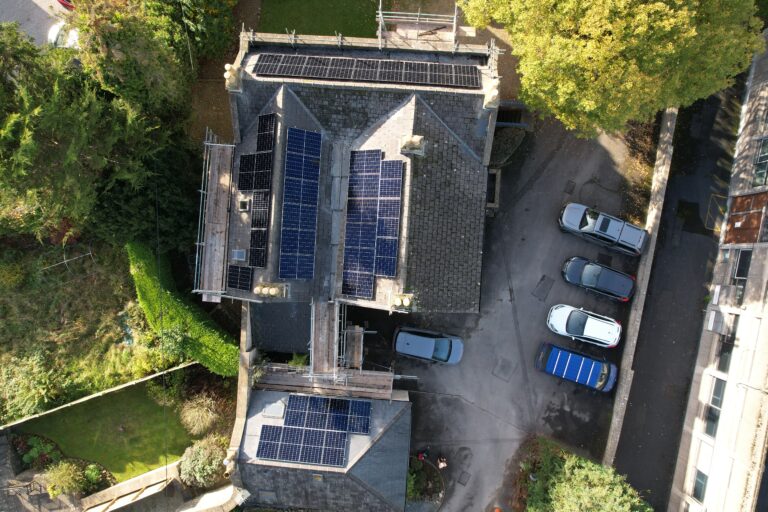
3. Solar Panel Installer Regulations and Certification
Your solar panel installer must be accredited under the Microgeneration Certification Scheme (MCS) or Flexi-Orb, Flexible Energy Oversight Registration Body, the installation standards scheme for renewable technologies to ensure your system is installed correctly and complies with solar panel installation regulations. MCS and Flexi-Orb certification guarantees that the installation meets industry standards for safety, performance, and quality.
MCS accreditation is essential for:
Ensuring high safety and efficiency standards, reducing risks related to faulty installations.
Accessing government incentives, such as the Smart Export Guarantee (SEG), which allows businesses and homeowners to earn money by exporting excess electricity to the grid.
The Flexible Energy Oversight Registration Body (Flexi-Orb) is a UKAS-recognised scheme ensuring high standards for renewable technology installations. It promotes quality, safety, and consumer protection in the green industry.
By choosing a Flexi-Orb Certified Installer, consumers benefit from:
✅ Qualified professionals handling their installation.
✅ Protection and support if issues arise.
Flexi-Orb safeguards both consumers and installers, ensuring trust, compliance, and peace of mind in the renewable energy sector.
Additionally, installers must be registered with a Competent Person Scheme (such as NICEIC or NAPIT) to legally perform electrical work. Always verify certification before hiring an installer.
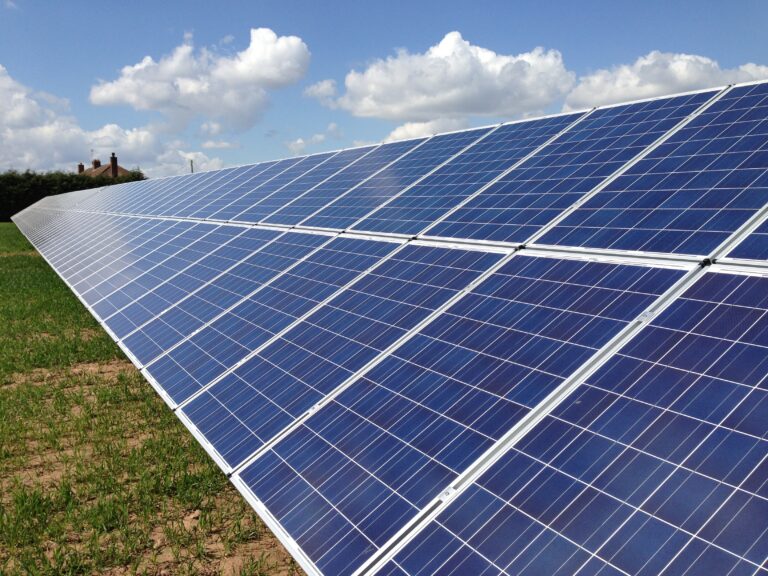
4. Battery Energy Storage System (BESS) Regulations
Adding a Battery Energy Storage System (BESS) to your solar panel setup improves efficiency by storing surplus energy for use during peak hours or selling it back to the grid. However, BESS installations must meet strict safety regulations to ensure secure operation and prevent hazards.
Key safety requirements include:
The system must be integrated with the property’s fire detection system for early warning in case of malfunctions.
Batteries should be installed outdoors or in a well-ventilated, non-living space to prevent overheating.
All wiring should be properly insulated and securely concealed to prevent electrical faults or fire risks.
5. What Happens If You Breach Solar Panel Regulations?
Non-compliance with solar panel installation regulations can lead to:
Mandatory removal of non-compliant solar panels.
Fines or legal action from local authorities
Voided insurance policies, leaving you unprotected.
Reduced property value due to unapproved installations.
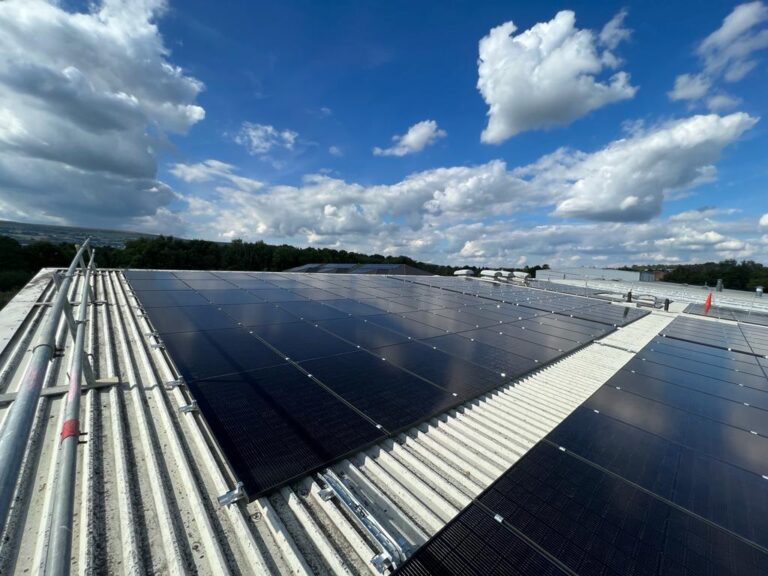
Commercial Solar Panels FAQs
The timeline for commercial solar panel installation varies based on system size, complexity, DNO requirements, and whether planning permission is needed.
Installation can take anywhere from a few weeks to several months. Once we design your system, we’ll provide a clearer timeframe.
If you have a deadline, let us know early and we’ll do our best to deliver within your timeframe and budget.
Commercial Solar PV panels have little maintenance requirements.
Based on your location, we recommend servicing your system bi-annually. It keeps your system working efficiently and defect free of malfunctions and damage, and each part getting a deep cleaning.
Additionally, it’s a wise practice to regularly maintain your solar PV panels and remove any debris and grime that can collect and obstruct sunlight to achieve optimum generation.
Yes, financing can include leasing a commercial solar system, Power Purchase Agreements (PPA), and grants at both government and local government levels.
Our team is updated with regards to current funding requirements and options. Do you have a commercial solar panel installation in mind and desire information regarding funding options? Get in contact with us today and let us update you with options applicable to your scenario.
Most commercial solar panels have an efficiency rating between 22% and 24%, representing efficiency at converting solar energy into electricity.
Advancements have reduced degradation rates remarkably, with panels lasting for 40 years and with high-energy output.
Several factors can impact the performance and efficiency of solar panels for photovoltaic use.
These include:
- The orientation of mounting of the panel
- The angle at which the panels are installed
- Any shroud that overlays panels
- The quality of the installation process
- The topology of the system (an optimized or conventional string inverter configuration)
- Routine maintenance and servicing
It depends on several factors:
- Your organisation’s use of energy
- Available spaces, including car parks, rooftops, and walls with a southern orientation
- Planning and DNO restrictions
- The technology embraced
We will build a system that will produce a high level of energy to serve your commercial needs. However, for a range of reasons, your commercial solar PV system will not necessarily serve all your needs for energy.
For most homeowners, planning permission for solar panels is not required unless the system exceeds standard placement rules. However, listed buildings, conservation areas, and oversised installations may require approval.
Do I need planning permission to install solar panels on a commercial roof?
Whether or not planning permission is required for installing solar panels on a commercial roof depends on factors like the scale of the installation and the type of property.
Small-scale installations
For smaller installations (typically those exceeding 50 kW but under 1 MW), you may only need prior approval. Many commercial properties, such as warehouses and industrial units, are often considered “permitted development,” meaning they may not require planning permission.
Larger-scale installations
If the installation exceeds 1 MW, you will likely need to submit a full planning application.
Listed buildings
Planning permission is required if the solar panels are being installed on a listed building. In this case, you’ll also need to obtain “listed building consent” (LBC) from your local council.
Other key considerations
- The solar panels should not project more than 1 meter from the roof or wall.
- Panels cannot be installed on a flat roof that faces a highway.
- The appearance of the building must not be significantly altered by the installation.
Additionally, you must obtain grid access permission from the grid operator to connect the solar system to the national grid. To ensure you meet all the requirements, it’s recommended to check with your Local Planning Authority (LPA) to confirm whether planning permission is needed for your project.
Yes, you must obtain permission from all co-owners or stakeholders before proceeding.
- Domestic installations: Typically 2–3 days, depending on complexity.
- Commercial installations: Depending on system size, usually 1-12 weeks or more.
Navigating solar panel building regulations in the UK can feel overwhelming, but having a clear understanding of the key requirements makes the process much easier. By adhering to solar panel installation regulations, placement guidelines, and electrical safety codes, you can ensure your solar panel system is legally compliant and operates efficiently. Working with MCS-certified professionals helps prevent legal issues, maximises energy savings, and ensures long-term system reliability.
If you’re considering solar panels or need guidance on compliance, contact our MCS-certified team today for expert advice, seamless installation, and complete regulatory peace of mind!
